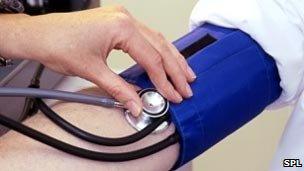Doctors cause a third of stubborn high blood pressure
- Published

Having blood pressure checked by a doctor can make the reading spuriously high
A third of hard-to-treat high blood pressure may actually be 'fake' and instead a patient's nervous response to being seen by a doctor, say experts.
They made the discovery when they continuously monitored the blood pressure of nearly 700,000 people as they went about their normal lives.
Some 37% of 8,295 patients thought to have stubborn or resistant hypertension actually had "white coat" hypertension.
The experts call for mandatory 24-hour checks, Hypertension journal reports.
The NHS advisory body NICE has recently proposed that patients suspected of having high blood pressure will get another check at home because of fears that nerves from being at a GP surgery may be leading to too many people being diagnosed.
It says so-called white coat hypertension affects a quarter of all people.
But the latest research suggests that the phenomenon may be more common and is leading some people to have aggressive medical treatment that they may not actually need.
Resistant hypertension occurs when a patient's blood pressure remains above treatment goals, despite using three different types of drugs at the same time.
It was these patients that the researchers focused on.
They asked the patients to wear a portable "ambulatory" monitoring device that takes blood pressure readings every 20 minutes day and night.
This revealed only 63% had true resistant hypertension. These tended to be patients who either smoked or had diabetes or a heart condition.
Study leader Dr Alejandro de la Sierra, from the University of Barcelona in Spain, said: "Physicians should be encouraged to use ambulatory monitoring to confirm resistant hypertension in their patients as it would ensure the most effective treatment options are used.
"Patients benefit by knowing whether their blood pressure is normal during daily activities or still needs the reinforcement of dietary and drug measures."
Ellen Mason, senior cardiac nurse at the British Heart Foundation, said the findings suggest that medication can work for more people than realised.
"Visiting the doctor seemed to make some people falsely appear resistant to the effects of these drugs so the study was helpful in trying to identify which people seemed to be truly resistant and therefore more at risk of organ damage.
"It also adds weight to new draft guidelines to include a home blood pressure test for hypertensive patients here in the UK."
But she said: "More worryingly though, nearly half of us who do have high blood pressure in the UK are not being treated for it.
"While the increasing use of home blood pressure monitoring is helpful for some, it will not target those who are unaware of the silent condition because it may have been many years since they had their blood pressure taken or because they simply think they are not at risk."
- Published22 February 2011
- Published22 February 2011